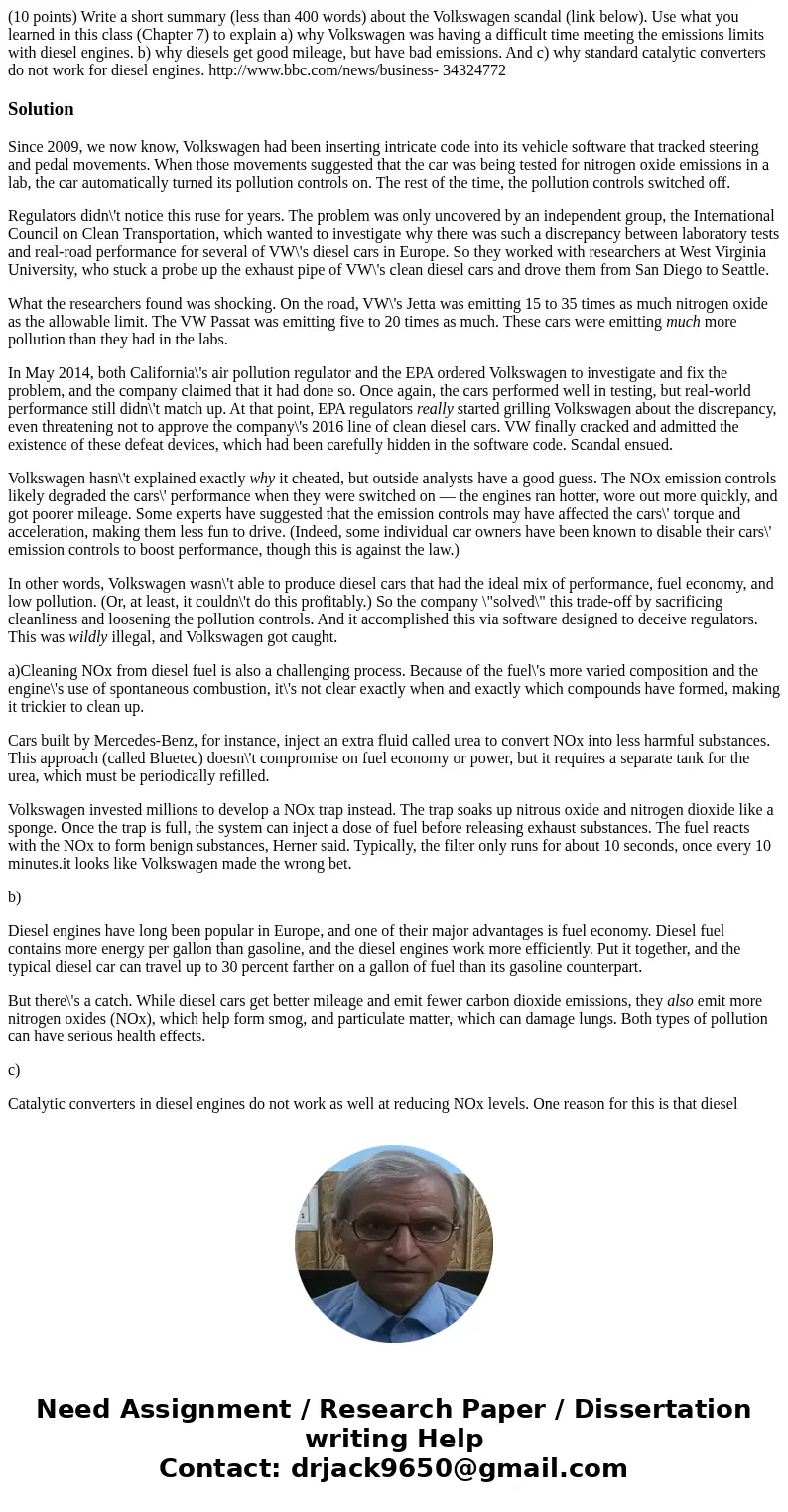10 points Write a short summary less than 400 words about th
(10 points) Write a short summary (less than 400 words) about the Volkswagen scandal (link below). Use what you learned in this class (Chapter 7) to explain a) why Volkswagen was having a difficult time meeting the emissions limits with diesel engines. b) why diesels get good mileage, but have bad emissions. And c) why standard catalytic converters do not work for diesel engines. http://www.bbc.com/news/business- 34324772
Solution
Since 2009, we now know, Volkswagen had been inserting intricate code into its vehicle software that tracked steering and pedal movements. When those movements suggested that the car was being tested for nitrogen oxide emissions in a lab, the car automatically turned its pollution controls on. The rest of the time, the pollution controls switched off.
Regulators didn\'t notice this ruse for years. The problem was only uncovered by an independent group, the International Council on Clean Transportation, which wanted to investigate why there was such a discrepancy between laboratory tests and real-road performance for several of VW\'s diesel cars in Europe. So they worked with researchers at West Virginia University, who stuck a probe up the exhaust pipe of VW\'s clean diesel cars and drove them from San Diego to Seattle.
What the researchers found was shocking. On the road, VW\'s Jetta was emitting 15 to 35 times as much nitrogen oxide as the allowable limit. The VW Passat was emitting five to 20 times as much. These cars were emitting much more pollution than they had in the labs.
In May 2014, both California\'s air pollution regulator and the EPA ordered Volkswagen to investigate and fix the problem, and the company claimed that it had done so. Once again, the cars performed well in testing, but real-world performance still didn\'t match up. At that point, EPA regulators really started grilling Volkswagen about the discrepancy, even threatening not to approve the company\'s 2016 line of clean diesel cars. VW finally cracked and admitted the existence of these defeat devices, which had been carefully hidden in the software code. Scandal ensued.
Volkswagen hasn\'t explained exactly why it cheated, but outside analysts have a good guess. The NOx emission controls likely degraded the cars\' performance when they were switched on — the engines ran hotter, wore out more quickly, and got poorer mileage. Some experts have suggested that the emission controls may have affected the cars\' torque and acceleration, making them less fun to drive. (Indeed, some individual car owners have been known to disable their cars\' emission controls to boost performance, though this is against the law.)
In other words, Volkswagen wasn\'t able to produce diesel cars that had the ideal mix of performance, fuel economy, and low pollution. (Or, at least, it couldn\'t do this profitably.) So the company \"solved\" this trade-off by sacrificing cleanliness and loosening the pollution controls. And it accomplished this via software designed to deceive regulators. This was wildly illegal, and Volkswagen got caught.
a)Cleaning NOx from diesel fuel is also a challenging process. Because of the fuel\'s more varied composition and the engine\'s use of spontaneous combustion, it\'s not clear exactly when and exactly which compounds have formed, making it trickier to clean up.
Cars built by Mercedes-Benz, for instance, inject an extra fluid called urea to convert NOx into less harmful substances. This approach (called Bluetec) doesn\'t compromise on fuel economy or power, but it requires a separate tank for the urea, which must be periodically refilled.
Volkswagen invested millions to develop a NOx trap instead. The trap soaks up nitrous oxide and nitrogen dioxide like a sponge. Once the trap is full, the system can inject a dose of fuel before releasing exhaust substances. The fuel reacts with the NOx to form benign substances, Herner said. Typically, the filter only runs for about 10 seconds, once every 10 minutes.it looks like Volkswagen made the wrong bet.
b)
Diesel engines have long been popular in Europe, and one of their major advantages is fuel economy. Diesel fuel contains more energy per gallon than gasoline, and the diesel engines work more efficiently. Put it together, and the typical diesel car can travel up to 30 percent farther on a gallon of fuel than its gasoline counterpart.
But there\'s a catch. While diesel cars get better mileage and emit fewer carbon dioxide emissions, they also emit more nitrogen oxides (NOx), which help form smog, and particulate matter, which can damage lungs. Both types of pollution can have serious health effects.
c)
Catalytic converters in diesel engines do not work as well at reducing NOx levels. One reason for this is that diesel engines run at a lower temperature than standard engines, and the converters work better as they heat up.

 Homework Sourse
Homework Sourse